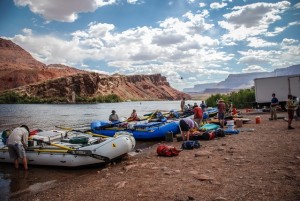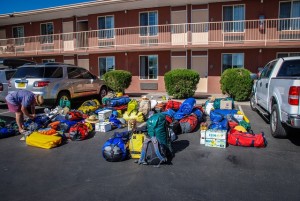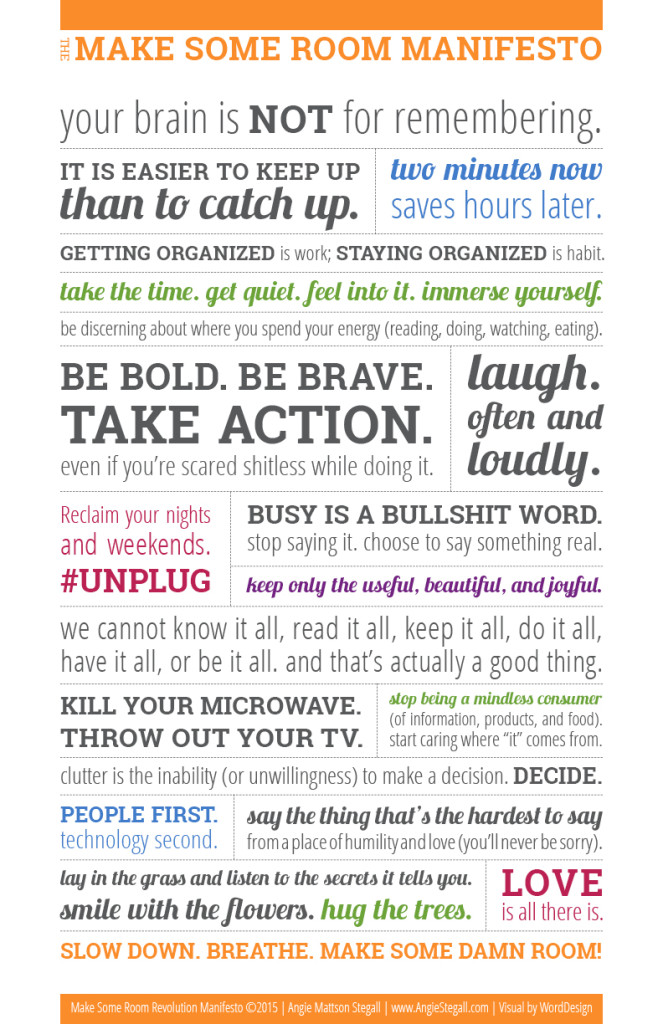Make Some Room Chapter One:
Your brain is not for remembering.
“Never memorize something you can look up.” Albert Einstein
 My group of 16 brave souls floated, rowed, and paddled the emerald waters of the Colorado River through Grand Canyon for 16 days. We covered 225 river miles (plus many more miles of hiking on side trips). We were physically exhausted at the end of most days.
My group of 16 brave souls floated, rowed, and paddled the emerald waters of the Colorado River through Grand Canyon for 16 days. We covered 225 river miles (plus many more miles of hiking on side trips). We were physically exhausted at the end of most days.
Our brains were exhausted some days, too. Taxed to the max in some situations, from knowing where we were on the river at any time, to anticipating the rapids coming up, and finally from the planning involved in finding a suitable camp by day’s end. Each day, our group leaders had major decisions to keep up with throughout the trip.
Thankfully, we relied on several tools to assist us so weren’t trying to “remember it all.”
Our trip leaders used guidebooks to help them plan and prepare. We all used checklists to gather our gear before packing and launching. Our supply company used checklists to pack our kitchen and emergency boxes and to pack our coolers with sixteen days-worth of food. And they gave us recipes (checklists, again) to help us prepare that food into satisfying (and some days, moral-boosting) meals.
All of our oarsmen (rowers) and kayakers used their brains to read the water and determine the right lines to run the rapids as safely as possible. We used our brains to tie up our boats safely at each stop and keep those boats in place overnight. And our Groover team (think portable potties) used their brains creatively to pick the best spots with the most glorious views for our bathroom set up.
We all helped each other remember to “wash your hands” and “drink more water.”
Tools for the trip
 Our first tool for the trip was the humble checklist that helped us prepare and pack for the trip. This “What to bring on a summer river trip” list, provided to us by our trip leaders, was super helpful to create piles of necessary items and check them off as we packed our gear bags. Because there are simply ZERO resources available down in the Canyon, you must be sure you have everything you need (and hope you don’t pack too much that you don’t).
Our first tool for the trip was the humble checklist that helped us prepare and pack for the trip. This “What to bring on a summer river trip” list, provided to us by our trip leaders, was super helpful to create piles of necessary items and check them off as we packed our gear bags. Because there are simply ZERO resources available down in the Canyon, you must be sure you have everything you need (and hope you don’t pack too much that you don’t).
Our second tool included a printout of the rapids with their descriptions and a couple of books with specific river miles laid out with campsites noted. During this trip, we needed to be aware of how far apart campsites were, what size group the camp
could accommodate, and to be careful not to be too ambitious about running major rapids at the end of a day when everyone was already tired. It was a logistical challenge and despite the majority of our group having one or more trips under their belt, having the books as guides was important. Things could have gone massively wrong if our trip leaders had relied solely on their memories!
Beyond the Canyon
Let’s face it: your life – and brain – is getting fuller by the minute. For better or worse, technology is adding complexities and layers your grandparents never had to deal with. Heck, you’re barely dealing with all the details that fill up your life, right? I mean, just think about how many passwords you have to have in this modern world. It’s mind-boggling!
Thankfully, adhering to one simple strategy – your brain is not for remembering – will go a long way towards taking the pressure off of your overloaded noggin’.
“If my brain isn’t for remembering,” you think, “then what is my brain for?”
Your beautiful brain is for creating, thinking, strategizing, and taking action.
Day-to-day, you may feel you don’t have room in your head (or schedule) for creating, thinking and strategizing because you’re so worried about forgetting something important.
You try so hard to remember something, trying to keep it “on your mind” or “top of mind.”
The problem is, your brain simply wasn’t made for this (nor is it good at it)! This causes you anxiety. Frankly, in a world where there are so many other details competing for your attention, trying to remember everything is lunacy.
What’s the solution?
Use your tools and technology – instead of your brain – to help you remember.
Tools and technology can be anything from a simple list on paper using a pen to a more sophisticated piece of software that does the “remembering” for you.
Suggestions for Making Some Room (in your brain):
- Create a system or process for an action or activity that is repetitive (like posting your blog to your website and sharing it through social media).
- Write out a checklist for recurring activities (like packing for trips or grocery shopping).
- Set recurring appointment, holiday, or birthday reminders using your electronic/online calendar.
- Start an “auto-order” or “repeat order” through your grocery store or online at Amazon.com for purchases you make repeatedly throughout the week, month, or year.
- Use a To-Do list to get things off your mind and captured in ONE place.
- Schedule your next appointment as soon as the current one is over.
- Use reminders in your calendar (instead of relying on your memory).
- Capture names, addresses (snail-mail and email), phone numbers, and other pertinent information into an address book or contact list online (instead of on sticky notes, papers, and napkins scattered throughout your life).
The idea is to remove the responsibility of “remembering” from your brain and assigning it to your tools and technology in every area of your life (and business).
It’s amazing how much calmer you’ll feel once you’ve done a “brain dump” and captured all those loose ideas, tasks, and To-Do’s that are currently banging around in your head.
It’s also amazing how much more prepared you are for any activity when you use a checklist to get ready for it. It worked for me on the Grand Canyon and it can work for you in your daily life.
Your brain will thank you for making this change by rewarding you with more calm and creativity, and by delivering up better solutions to issues, problems, dilemmas and more.
Your brain is not for remembering – your tools and technology ARE!
Also, stay tuned for Chapter Two (It is easier to keep up than to catch up) next week!
 [All content and photos are (c) 2016 Angela Mattson Stegall and Nelson Stegall for the book, Make Some Room: Powerful Life Lessons Inspired by an Epic 16-day Colorado River Rafting Trip Through Grand Canyon.The book will be available mid-June through Amazon.com in paperback and Kindle formats.]
[All content and photos are (c) 2016 Angela Mattson Stegall and Nelson Stegall for the book, Make Some Room: Powerful Life Lessons Inspired by an Epic 16-day Colorado River Rafting Trip Through Grand Canyon.The book will be available mid-June through Amazon.com in paperback and Kindle formats.]

[…] “I’ll get to it later,” you sigh. And off you go to the next thing on your mind. […]